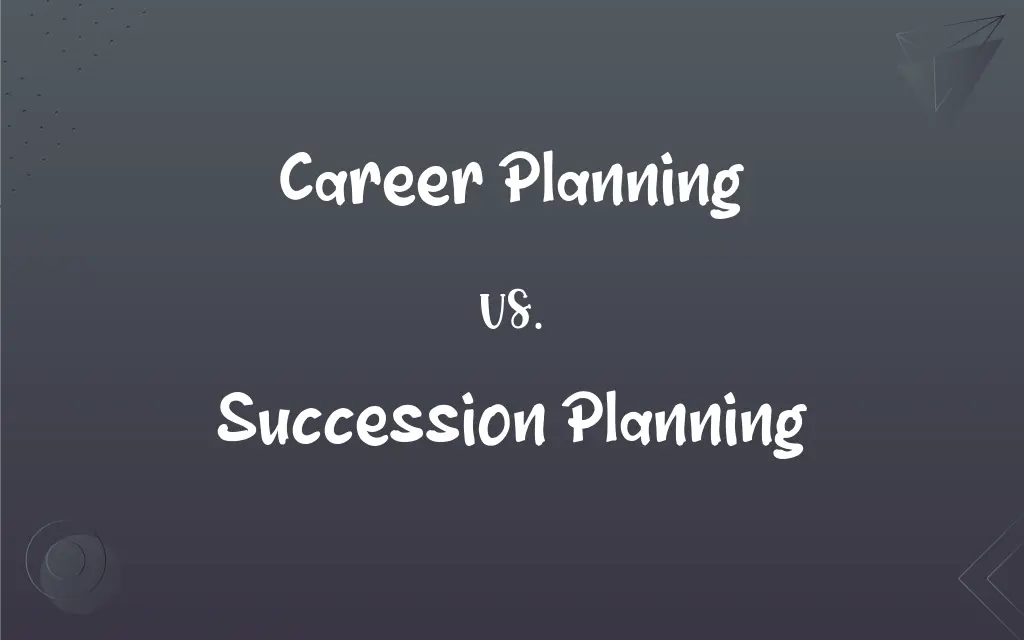Career Planning vs. Succession Planning: What's the Difference?
Edited by Aimie Carlson || By Janet White || Published on December 22, 2023
Career planning is the process of setting individual career goals and paths to achieve them. Succession planning is a strategy by organizations to identify and develop future leaders.

Key Differences
Career planning is an individual's process of setting their career goals and mapping out steps to achieve these goals. It involves personal reflection, skill assessment, and envisioning a future career path. Succession planning, however, is an organizational strategy focused on identifying and preparing suitable employees to take on key positions when they become vacant.
In career planning, the individual considers their interests, strengths, weaknesses, and educational requirements. They plan for career advancement, skill development, and job changes. Succession planning is carried out by an organization to ensure continuity in key roles, prevent knowledge loss, and maintain operational stability.
Career planning is often self-initiated and focuses on personal growth and job satisfaction. It can involve seeking mentorship, training, and new experiences. Succession planning is a proactive approach by an organization to train and develop employees for future leadership roles, ensuring the company's resilience and long-term success.
Career planning is a continuous, lifelong process that evolves with an individual’s changing goals and life stages. It often includes exploring different careers and industries. Succession planning, on the other hand, is more about the organization’s future needs and focuses on developing a talent pool for critical positions.
The outcomes of career planning are personal achievements and career fulfillment for individuals. Succession planning’s outcomes are more strategic, aimed at organizational stability and leadership continuity.
ADVERTISEMENT
Comparison Chart
Focus
Individual career growth
Organizational leadership continuity
Initiated by
Individual
Organization
Main Objective
Personal career development
Preparing employees for future key roles
Process
Self-assessment, setting personal goals
Identifying and training potential leaders
Outcome
Personal career fulfillment
Organizational stability and readiness
ADVERTISEMENT
Career Planning and Succession Planning Definitions
Career Planning
A continual process of evaluating one’s career goals and pathways.
Career planning helped him decide to pursue an MBA.
Succession Planning
Organizational preparation for future personnel changes in key roles.
Succession planning was crucial for the company after sudden executive departures.
Career Planning
The process of setting personal career objectives and strategies.
She engaged in career planning to shift from marketing to graphic design.
Succession Planning
The method of creating a talent pipeline for critical roles in a company.
Their succession planning focused on training junior managers for senior positions.
Career Planning
The ongoing process of self-assessment and goal setting in one’s career.
Regular career planning sessions helped her stay focused on her professional goals.
Succession Planning
Organizational strategy to prepare for key position turnovers.
Succession planning led to effective internal promotions for leadership roles.
Career Planning
Personal development planning in relation to one's professional life.
His career planning involved attending workshops to improve his skills.
Succession Planning
The process of identifying and developing future leaders within an organization.
The company's succession planning ensured a smooth CEO transition.
Career Planning
The act of mapping out a career path and the steps to achieve it.
Through career planning, she realized her interest in non-profit management.
Succession Planning
A proactive approach to ensure leadership continuity in a business.
The board implemented succession planning to prepare for the founder's retirement.
FAQs
Can career planning change over time?
Yes, career planning can evolve with changing interests and life stages.
Who is responsible for succession planning in a business?
Typically, human resources and senior management are responsible.
How often should one engage in career planning?
Regularly, as it’s an ongoing process reflecting personal and professional growth.
What is the main goal of career planning?
The main goal of career planning is personal career growth and fulfillment.
Is career planning important at all career stages?
Yes, it’s important at all stages for continuous professional development.
What is the purpose of succession planning in a company?
The purpose is to ensure leadership continuity and prepare for key position changes.
What tools can assist in career planning?
Tools like career assessments, mentoring, and professional workshops can assist.
How does succession planning benefit an organization?
It ensures smooth transitions in leadership and critical roles, maintaining stability.
How does succession planning handle unexpected vacancies?
It prepares the organization to quickly fill vacancies with capable personnel.
Can succession planning help in employee retention?
Yes, by offering career advancement opportunities within the organization.
What roles are targeted in succession planning?
Key roles, especially leadership and critical operational positions.
Is networking part of career planning?
Networking is a key component for opportunities and insights.
Can career planning be self-directed?
Yes, it’s often a self-initiated and self-directed process.
Should career planning consider personal interests?
Absolutely, personal interests are crucial in setting fulfilling career goals.
Can career planning include changing industries?
Yes, it can include exploring different careers and industries.
How long-term is succession planning?
It’s a long-term strategy, focusing on future organizational needs.
What is a talent pool in succession planning?
A group of employees identified as potential future leaders.
What is a succession plan in a family business?
It’s a plan for passing leadership and management to the next family generation.
Does succession planning involve external recruitment?
It primarily focuses on internal talent development, but can include external strategies.
How do mentors help in career planning?
Mentors provide guidance, advice, and support in career development.
About Author
Written by
Janet WhiteJanet White has been an esteemed writer and blogger for Difference Wiki. Holding a Master's degree in Science and Medical Journalism from the prestigious Boston University, she has consistently demonstrated her expertise and passion for her field. When she's not immersed in her work, Janet relishes her time exercising, delving into a good book, and cherishing moments with friends and family.
Edited by
Aimie CarlsonAimie Carlson, holding a master's degree in English literature, is a fervent English language enthusiast. She lends her writing talents to Difference Wiki, a prominent website that specializes in comparisons, offering readers insightful analyses that both captivate and inform.
































































